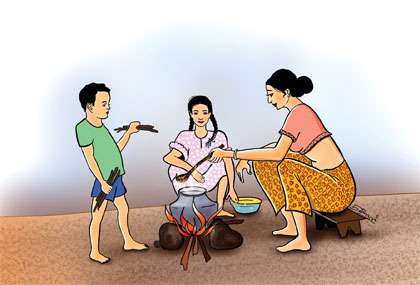Food and nutrition tips for a healthy Ramadan
{{hitsCtrl.values.hits}}
7 July 2014 10:22 am
[metaslider id=577]
By Shabnam Farook
Farewell to fried food
It’s time to say good-bye to junk foods, toxins, and bad habits. Research has shown that fried food damage your body and brain in many ways, clogging arteries and lead to strokes, Alzheimer’s disease, inflamed joints, heart attacks, aneurysms, and elevated blood pressure.Purify the Body, Illuminate the Soul
During Ramadan the body needs the right fuel to run at optimum performance. This means eating food that provides long, slow release of energy as well as vital vitamins and minerals.Breaking Fast: Dates and Water
First and most important is hydration. Hydration is going to be the key factor, therefore you have to monitor, regulate, and force yourselves to drink water. It is essential during this 6 hour window that we drink at least 2 liters or 3 ½ pints of water. It can be broken down like this:- Iftar: 500 ml water and dates. You can add a spoon of honey to your iftar water, not only for the energy but also for the healing, anti-bacterial, and anti-fungal properties, as well as much more.
- Every hour after that 300 ml or 10 oz of water including at suḥūr.
Maghrib with a Side of Fruits
Eat some sort of fruit salad, fruit juice, or smoothie after breaking fast with water and dates. If time is not on your side, buy pressed fruit juice with bits, not smooth and not concentrate. If you are making it at home, smoothies are better than juices because they contain soluble and insoluble fibers. Fiber is good to combat constipation, encouraging elimination of toxins. It’s good for the digestive and circulatory systems of the body. Fruits digest more quickly than vegetables, opening the digestive canal and providing energy, vitamins, and minerals to the organs. To combat your thirst at iftar, have a watermelon smoothie, with honey and lemon, then have another type of fruit smoothie. Melons are the quickest of fruits to digest, taking only 20 minutes. Watermelon can be blended or juiced, including the skin and seeds, which contain the important minerals magnesium, manganese, phosphorus, Zinc, Iron, potassium and copper. All essential! Keep the = smoothies just fruits, no nuts, no dairy, no veggies, then pray Maghrib. This will give your digestive tract time to open up, absorb these essential sugars, vitamins, and minerals and give you energy for the rest of the evening.Veggie-Licious
Remember to drink more water while you are preparing this next part of the meal. After Maghrib eat something vegetarian, healthy, and tasty. Have high fiber salads with an amazing dressing or soup. Raw vegetables also have high water, mineral, and vitamin content. This is where you can also eat your starchy carbs; black, brown, or red rice, whole-meal bread, whole-meal barley, oats, and pasta. White flour, white sugar, and white rice are all refined, processed food should be avoided for optimum nutrition. This is the best time for your healthy oils. Use olive oil for cooking or salad dressings. Healthy oils are essential for good mental health, helping the brain make the right connections, joint mobility, and lubrication of internal mucous membranes. Everything internal, even the cell walls, need oil.Suhur: Protein Time
This meal needs to be animal protein and vegetables, but not starchy carbs like rice, pasta, or bread for optimum nutrition. Source- InternetLeave a reply
Reply To:
Name - Reply Comment



Comments